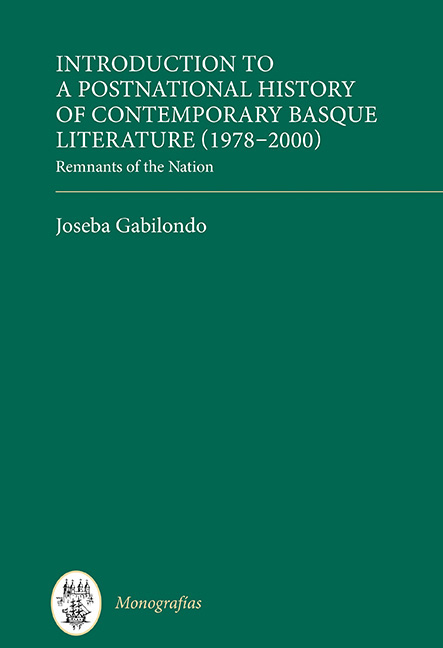 Introduction to a Postnational History of Contemporary Basque Literature (1978–2000)
Introduction to a Postnational History of Contemporary Basque Literature (1978–2000) Book contents
- Frontmatter
- Contents
- Preface and Notes on the Translation
- Acknowledgements
- I Postnational Theory and History
- 1 Postnationalism and Basque Literary History
- 2 Minor and Major Literatures: A Postnationalist Approach
- 3 From National to Postnational: A History of Twentieth–Century Basque Literature
- II Writing the Nation: On Atxaga's Ethiopia and Obabakoak (1978-92)
- III After the Nation: Hybrid Postnational Literatures (1992-2000)
- Epilogue: Basque Literatures 2001-17
- Works Cited
- Index
3 - From National to Postnational: A History of Twentieth–Century Basque Literature
from I - Postnational Theory and History
Published online by Cambridge University Press: 06 September 2019
- Frontmatter
- Contents
- Preface and Notes on the Translation
- Acknowledgements
- I Postnational Theory and History
- 1 Postnationalism and Basque Literary History
- 2 Minor and Major Literatures: A Postnationalist Approach
- 3 From National to Postnational: A History of Twentieth–Century Basque Literature
- II Writing the Nation: On Atxaga's Ethiopia and Obabakoak (1978-92)
- III After the Nation: Hybrid Postnational Literatures (1992-2000)
- Epilogue: Basque Literatures 2001-17
- Works Cited
- Index
Summary
Many geopolitical minorities have historically understood that their survival is more likely to be guaranteed within an empire than within a nation–state. It would not be a scandal among some Basques to proclaim that the arrival of globalization has had beneficial effects so far. Clearly, globalization is a North American imperialistic formation in which the European Union amounts more to a mere historical reaction than a past enlightened dream finally come true. Yet globalization also represents a way out of the oppressive effects of the French and Spanish nation–states and of their imperialist–nationalist political and cultural institutions.
The increasingly global Basque reality of the 1990s manifested itself in many different political forms, some nationalist and others non–nationalist. On the Spanish side, a semi–federal or autonomous reality for the Spanish provinces of Bizkaia, Gipuzkoa, and Araba (Basque Autonomous Community or BAC) and a separate and similar semi–federal organization for the Spanish province of Nafarroa (Navarre) constituted two new political realities established after 1978. On the French side, a new and unprecedented nationalist force was created, which managed to establish new alliances with other non–nationalist forces. Although these unification moves remain unstable to this day, they were unthinkable in a Jacobin centralist state such as France just a few years before. All in all, however, the French side continued to be non–nationalist and remained part of a larger non–Basque political unity: the Department of the Atlantic Pyrenees (within the administrative region of Aquitaine–Limousin– Poitou–Charentes). Finally, the Basque diaspora, mainly in Europe and the Americas – but also in Australia and China – found institutional recognition in the Basque Autonomous Community,4 and became a new and global Basque reality, which no longer was diasporic (for that implies the preexistence of a nation–state) but rather post–diasporic: the traffic between the continental Basque Country and other (mainly) American post–diasporic enclaves became global and daily although still sparse. Although the future of all these political and cultural realities still remains uncertain, they became historically more vigorous in the 1990s than they had been since World War II.
As a result of globalization, two new Basque realities, two faces of the same coin, made their presence felt in the complex and heterogeneous Basque Country of the 1990s: the eruption of different public spheres – which did not correspond with those of the nation–state – and the commodification of Basque cultures.
- Type
- Chapter
- Information
- Introduction to a Postnational History of Contemporary Basque Literature (1978–2000)Remnants of the Nation, pp. 37 - 58Publisher: Boydell & BrewerPrint publication year: 2019
